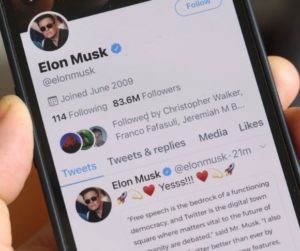
(Photo Illustration by Scott Olson/Getty Images)
The Media Research Center (MRC) recently released a report demonstrating why progressives are melting down over Tesla CEO Elon Musk’s purchase of Twitter. MRC also showed why the company, as well as other Big Tech organizations, are in need of serious reform when it comes to online speech and politically biased censorship.
Through its CensorTrack database, MRC has cataloged 646 instances in which Big Tech has taken action against users who criticized President Joe Biden. Facebook and Twitter punished these individuals by deleting their comments, banning them, or restricting their activity. The study was conducted between March 10, 2020, and March 10, 2022.
About 25% of the 646 cases involved people posting about the New York Post story revealing that Hunter Biden, the president’s son, allegedly engaged in shady foreign business dealings as well as other embarrassing information. But the majority of instances involved posts about the sniffer-in-chief’s penchant for inappropriate contact with women and children. From the report:
“In one case, a user reported that Facebook deleted a post that showed three photos of Biden kissing what is reportedly his granddaughter on the lips. It followed with a caption that said: ‘Find someone who kisses you the way Joe Biden kisses his granddaughter.’ Snapshots indicated that Facebook claimed the post violated its community standards on ‘nudity or sexual activity.’”
MRC found 232 cases of “comedic memes, videos, or generic posts about Biden’s conduct,” a little more than one-third of the total. Other instances involved users quoting the president’s gaffes, poking fun at his apparent ineptitude. The companies even targeted notable political figures like former President Donald Trump, Senator Ted Cruz (R-TX), House Minority Leader Kevin McCarthy (R-CA), and several right-leaning news outlets.

(Photo Illustration by Scott Olson/Getty Images)
MRC’s team “logged over 3,600 overall cases of censorship on multiple Big Tech platforms concerning a myriad of issues such as elections, COVID-19, climate change and race,” according to the report. The data are disturbing when one considers that there are likely thousands of other cases the organization did not catch.
These findings were revealed as Musk sets to take over Twitter, a move that has frightened progressives who are wringing their hands over the possibility that he might frustrate their censorious efforts. Indeed, he has already indicated that free speech is a primary motivation behind buying the company, and it is expected that he will work to make the platform a more level playing field for conservative ideas to flourish as much as they do for the left.
This development has already sparked a renewed discussion on the government’s potential involvement in regulating Big Tech companies, and it can be expected that Democrats will do more than just talking about cracking down on social media companies who do not censor enough for their tastes. During a recent conference, White House Press Secretary Jen Psaki indicated the White House believes Congress should take a more active role in regulating Big Tech. She said:
“Well, I think we engage regularly with all social media platforms about steps that can be taken that has continued, and I’m sure it will continue. But there are also reforms that we think Congress could take and we would support taking, including reforming Section 230, enacting antitrust reforms, requiring more transparency. And the president is encouraged by the bipartisan support or engagement in those efforts.”

Barack Obama (Photo by Chip Somodevilla/Getty Images)
Former President Barack Obama chimed in on the matter April 21 at a Stanford Cyber Policy Center event. “The First Amendment is a check on the power of the state. It doesn’t apply to private companies like Facebook or Twitter, any more than it applies to editorial decisions made by the New York Times or Fox News. Never has,” he said. “Social media companies already make choices about what is or is not allowed on their platforms and how that content appears. Both explicitly through content moderation and implicitly through algorithms. The problem is we often don’t know what principles govern those decisions.”
Several other high-profile Democrats have brought up Section 230, and one doesn’t need a crystal ball to predict it will become another hot topic on the airwaves in the coming weeks. While Democrats likely won’t succeed at passing any meaningful legislation to regulate Big Tech, it is all but certain they will continue trying anyway – especially if Musk rolls back Twitter’s censorship practices.
Remember to check out the web’s best conservative news aggregator
Whatfinger.com — the #1 Alternative to the Drudge

